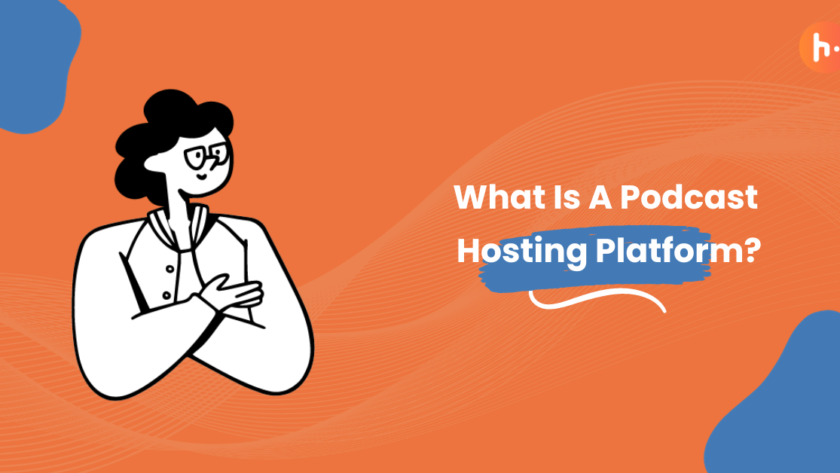So, you finally have a rocking idea for your podcast. You’ve mapped out your episodes, made a rough script, and hit the record button. But what next? Where does one go from here? You want people to tune into your podcast, but how will that happen? Well, this is where your podcast hosting platform comes to your rescue, wearing a superhero cape.

To many, podcast hosting is a mystery.
What really is podcast hosting, and why do I need it?
Can I podcast without a hosting provider?
What if I end up choosing and paying for the wrong hosting platform?
Will the hosting services cost me a fortune?
All these question marks will float around your mind. Don’t worry because we’ve got you covered. In this article, we’ll uncover what’s a podcast hosting platform, why you need one, and everything in between. Let’s dive in!
What Is A Podcast Hosting Platform?
Just like you use a website host to store your blogs, videos, and other content online, you’ll require a podcast hosting platform to host and store your podcast’s media files. Hosting providers are most apt for your podcast as they use servers specifically designed to store sizable media files that can be further downloaded and distributed.
Besides providing storage, hosting platforms also handle your podcast distribution, ensuring that your show reaches as many listeners as possible. This is done through an RSS feed created by the platform that acts as a single power link containing all your podcast details like the podcast title, cover art, and information about your show and episodes.

Why Do You Need A Podcast Hosting Platform?
While podcast hosting through a website has its pros, it doesn’t provide you with all the services you’ll need to grow your show. Here are two major reasons why you need a hosting platform for your podcast:
Storage
When you create a podcast, you create large media files that require proper space and storage so that they can function well.
Many websites don’t have enough bandwidth or storage required to safely keep heavy audio and video files. It might lead to slow loading or page crashes, resulting in a bad user experience.
However, a hosting platform is built specifically to meet all your podcasting needs, whether it’s storage, analytics, or promotional features.
Distribution
In order to reach your audience, your podcast should be available on all major directories like Apple Podcasts, Spotify & Google Podcasts. To distribute your podcast to all these streaming platforms, you’ll have to submit your podcast RSS feed to them.
When you host your podcast on a hosting platform, the provider creates an RSS feed for you automatically without any manual effort from your end. It not only allows you to upload new episodes, audio files & cover arts to that RSS feed but also further submit it to all major directories with a single click.
Analytics
A good podcast hosting platform will give you analytics that will help you make data-driven decisions. What kind of analytics are helpful for a podcaster? Here are a few that can help you immensely:-
- Total listens
- Total streams (or Downloads)
- Performance comparison of your episode
- The time your listeners are tuning in to listen your podcast
- Listener demographics information
- The platforms wise breakdown of your podcast’s performance
How To Pick A Good Hosting Platform For Your Podcast?
When picking a hosting platform, it all comes down to your podcast goals and needs. If you are a hobbyist, you can opt for a hosting platform that offers basic features like an RSS feed, distribution, and basic analytics.
If you are looking to podcast at a professional level, then there are platforms that offer more advanced features like advanced analytics, monetization, promotional features, and private podcasting.
Many hosting platforms provide additional features to help you promote and monetize your show. While picking a hosting provider, you must look out for these features and ensure they help you with your podcast goals. Here are the things you can consider when choosing a podcast hosting platform:
Storage Bandwidth
Your storage requirements depend on how long you are going to run your podcast. If your podcast is a one-time small project and you are looking at uploading only a couple of episodes, then you can work around limited space.
BUT, if you are starting a podcast with multiple seasons in mind, something you’ll continue for a long time, you’ll have to look for a hosting platform with good storage capabilities. The bandwidth of a platform will determine how many episodes you’d be able to upload and how many people would be able to listen and download them.
Even if your episodes are short or you don’t expect many listeners, you should still consider a scenario where your listener base grows or your episodes run longer & more frequently.
You can find different hosting platforms, paid and unpaid, with different storage options. This is when you should invest wisely in a provider, taking in your requirements and future podcast plans so that you can upgrade easily when the time comes.
Analytics
Many podcast hosts offer you advanced podcast analytics to better understand your audience and listener trends. Comprehensive details like top locations, top hours, and total downloads can help you make better data-driven decisions to improve your content strategy and skyrocket your growth.
Podcast analytics not only help you track your performance but also bring you many opportunities. Major media networks, brands & advertisers use the above insights to make decisions about their advertising budgets.
With certified numbers backing you up, you can easily grab these opportunities and further strengthen your podcast and community.
Ease-Of-Use & Support
No matter how many exciting features a platform is offering you, if you can’t find your way around it, then it’s not the right fit for you. So, before committing to a hosting provider, make sure you take a tour. You can find a ton of videos on YouTube with honest reviews of popular platforms.
Besides the ease of use, you should also check for good support capabilities. Especially if you are not tech-savvy, pick a platform that’s got your back when it comes to dealing with the tech side of podcasting. Go through their help center and see if they have good help articles. This way, if you run into any major issues, it will not affect your podcast.
Embedded Player Capabilities
To allow listeners to stream your show on your website, every podcast host provides an embedded player. Often provided as an embeddable code, the embedded player can be inserted into the backend of your podcast website.
Though an embedded player doesn’t have a lot of features, it can still be customized to enhance the listening experience. Make sure your podcast host provides an embed player that looks good and functions well.
Monetization
A lot of time & resources go into creating a podcast show. If you are in it for the long run, then monetizing your show must have crossed your mind. Even if you podcast for a hobby, getting paid for your hard work motivates you to do better.
However, podcast monetization is fairly new. Many hosting platforms are still figuring out how they can help their creators earn a steady income from their shows.
Some platforms will come with premium subscription capabilities, and some will only support monetization through listeners, for instance, affiliate marketing, donations, etc. There are platforms that provide a good ad marketplace but might lack in other spectrums. Make sure you consider all the pros and cons of the platform before committing to one.
Creation & promotion tools
Creation and promotion tools are equally important. Recording and editing your podcast should be easy, and it should be even easier to spread the word about it. Look for features like audio editor, podcast website, and player embed. These will help you promote your show on social media.
Some podcast hosts come with in-built tools, while some direct you to third-party platforms. In any case, you need to find your tuning between creating and promoting your show with your hosting provider.
Price
This is a no-brainer. Some of you might be looking at podcasting as a hobby and some as a professional career. Depending on your needs, it’s only fair to consider how much you are willing to invest.
As a hobbyist, we’d recommend you to go for a free platform that provides you with basic features. If you want to create a professional podcast, then a paid platform might be a good choice. These platforms often come with cutting-edge technology to meet the specific requirements of the creators.
Even when you are cruising through paid hosts, make sure to review each of their plans carefully so that you don’t get the short end of the stick. The platforms usually charge more for storage and bandwidth, so decide how much of each you’ll need before buying any plan. You wouldn’t want to pay for storage or features you won’t be using.
Conclusion
A podcast hosting platform can make or break your show. Research well to find the best fit for you, as it’ll definitely pay off in the long run. Keep in mind all you need to get your podcast on the road and then only commit to a hosting provider.
We at Hubhopper have always prioritized awesome podcasters like yourself. So, we have a Basic Free plan for podcasters who are just dipping their toes in the podcasting world as well as a PRO plan for the pros out there.
If you want to start your journey and want an easy-to-use podcast hosting platform that doesn’t compromise on all the things you need to grow, join the Hubhopper Tribe.
I hope that the blog answered what is a podcast hosting platform and helped you choose the one that suits you. If you want to stay connected to us, follow us on Instagram, Facebook, LinkedIn or Twitter.





Ariatna Sheik
YkQrPUvpFGa
WiyActXqEop